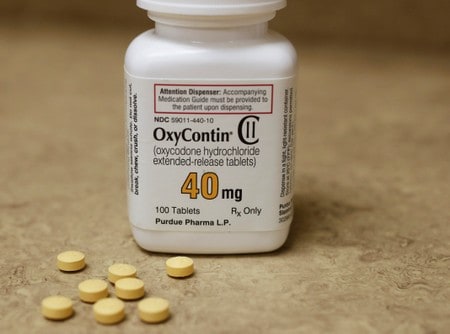By Nate Raymond
(Reuters) – Lawyers for counties and municipalities suing drug manufacturers and distributors over their alleged roles in the U.S. opioid epidemic on Friday pitched a novel plan that would bring all 24,500 communities nationally into their negotiations for billions of dollars in settlements.
The proposal came in a motion filed in federal court in Cleveland, Ohio, where 1,850 lawsuits largely by local governments are pending accusing companies including OxyContin maker Purdue Pharma LP of fueling the opioid abuse crisis.
The plaintiffs’ lawyers sought to certify for the purpose of settlement talks a class that would include every U.S. county and municipality in the country, who would then have the right to vote on accepting any deal with a company.
The lawyers say the proposal fits with calls by U.S. District Judge Dan Polster, who presides over the cases, for a national settlement that would “do something meaningful to abate this crisis.”
Joe Rice, a lawyer for the plaintiffs at the law firm Motley Rice, said the proposed framework would allow companies the chance at global peace without worrying more lawsuits could emerge.
“The aim is to form a united group vested with the power to negotiate, vote on and deliver finality if there is an opportunity to negotiate a settlement,” Rice said.
Rice acknowledged that some defendants may oppose the proposal out of concern it could expose them to greater liabilities. Many local governments have also chosen so far to not sue and could decide to opt-out.
Elizabeth Chamblee Burch, a University of Georgia law professor, said it was unclear if the courts ultimately would allow such a large class of localities to be given class action status, which have increasingly been harder to get approved.
“I think it will be an uphill battle,” she said.
Drug distributor Cardinal Health Inc, a defendant in the cases, called the proposal “a novel and untested approach that is likely to face extended legal challenges and lead to years of collateral litigation.”
Stamford, Connecticut-based Purdue in a statement said it was “committed to working with all parties toward a resolution.” Other companies had no immediate comment.
Opioids were involved in a record 47,600 overdose deaths in 2017, the U.S. Center for Disease Control and Prevention says.
The lawsuits allege that drugmakers such as Purdue, Johnson & Johnson and Teva Pharmaceutical Industries Ltd overstated the benefits while downplaying addictive risks of opioids in marketing their pain treatments.
They also accuse distributors like Cardinal, McKesson Corp and AmerisourceBergen Corp of failing to halt suspicious opioid orders.
The companies deny wrongdoing and say they cannot be found to be the overdose epidemic’s cause. Plaintiffs claim it could cost about $480 billion to address the epidemic, according to defense court filings in April.
In addition to the cases before Polster, others are in state courts, including a lawsuit by Oklahoma’s attorney general against J&J that is now on trial after the state reached settlements worth $270 million with Purdue and $85 million with Teva.
The first trial before Polster is set for October.
(Reporting by Nate Raymond in Boston; Editing by Bill Berkrot)


